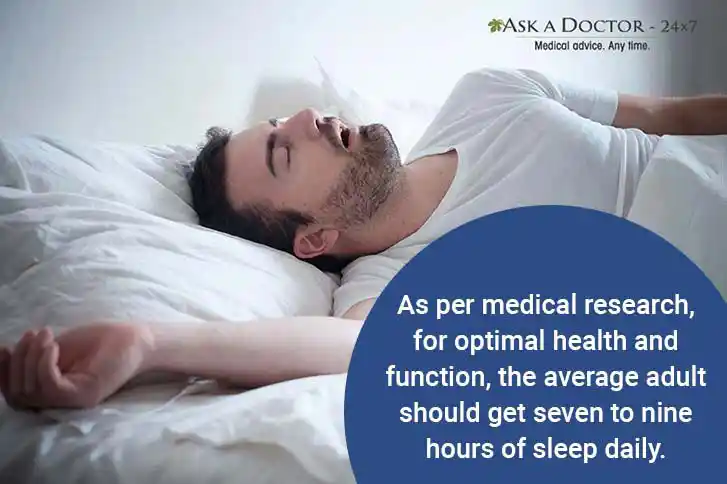Lack Of Sleep Can Cause You To Gain Weight! Here's How?
Feeling frustrated at not being able to shed those extra pounds despite regular physical activities? Well, the reason could be as simple as your lack of sleep! Various studies have shown that people are more likely to get obese if they don’t get 6 to 7 hours of quality sleep at night.
Sound sleep is the elixir to mental and physical well-being. You can enhance your metabolism and lose a considerable amount of body weight by just getting good quality sleep. Let’s delve into details to understand the role of sleep in weight management.
How sleep deprivation adds extra pounds?

If you don’t get adequate sleep at night, it will:
- Affect your hormones: Ghrelin and Leptin are the two hormones that regulate our appetite and hunger. Sleep deprivation activates the hormone Ghrelin, which increases the feeling of hunger, resulting in more calorie intake. It also reduces the production of hunger-satiating hormone Leptin. If you want to shed extra pounds, you want less Ghrelin. So, improve your sleep pattern.
- Cause fatigue: If you feel lazy and tired throughout the day, you won’t feel like hitting the gym, which in turn leads to procrastination, as far as physical activity is concerned. This then turns into a vicious cycle.
- Increase appetite: Imagine feeling sleepy at work. You will be tempted to tuck into calorie-dense food like candies, wafers and coffee (several cups) for that instant boost of energy. This will, over time, increase your girth and waist line, and consequently increase your BMI. It has been found that a sleepy brain responds more strongly to high-calorie food, and has little or no ability to rein in the impulse to overeat.
- Make you vulnerable to excess usage of Internet and phone: Browsing the Internet during bedtime and watching late-night movies may lead to late-night snacking, which, in turn, fuels the vicious cycle of sleep deprivation and weight-gain.
- Raise the level of stress hormone: Cortisol level increases when you are sleep-deprived, which, in turn, interferes with the body’s metabolic functioning. It decreases insulin sensitivity, making the body less capable of absorbing glucose from blood. This increases the craving for fatty and sugary foods. Fat accumulation due to increase in cortisol levels typically occurs around mid-belly.
How much sleep do we really need?

The amount of sleep you need every night is determined by your age. Here’s an overview of how much sleep humans need across age groups:
- Pre-schoolers (3-5 years) - 10-13 hours
- School-going children (6-13 years) - 9-11 hours
- Teenagers (14-17) - 8-10 hours
- Adults (18-64) - 7-9 hours
- Older adults (65+) - 7-8 hours
9 steps to get a good sleep
.jpg)
Catch a good night’s sleep to stay healthy from within and refreshed throughout the day. Follow these simple tips for getting sound sleep:
- Consistent bedtime routine: Follow your sleep schedule, even on weekends. This helps maintain the biological clock.Exercise regularly: It helps reduce stress and makes you feel tired. Early morning exercise also helps in resetting the sleep-wake cycle. Avoid exercising 3 to 4 hours before bedtime.
- Design your sleep environment: Maintain an ideal temperature in your bedroom and make sure it is sufficiently lit. It is important to ensure there is no noise. Sleep on a comfortable mattress and pillow.
- Reduce stress: The main cause of insomnia is stress. De-clutter your thoughts and handle your emotions efficiently; meditation can really help. For a relaxed transition to sleep, you can meditate while in bed.
- Avoid stimulants: For a sound sleep, avoid taking caffeine or alcohol 4 hours before bedtime.
- Maintain circadian rhythm (internal clock): Make sure you get enough exposure to natural sunlight, so that the body knows it’s time to release sleep hormones around evening.
- Eat healthy and regularly spaced meals: Avoid eating high-calorie foods or heavy meals close to bedtime. It can interfere with your sleep cycle.
- Avoid liquids: Avoid intake of water at least 3 to 4 hours before bedtime to avoid frequent trips to the washroom.
- Switch off electronics before bedtime: Bright blue light from electronic gadgets suppresses sleep hormones. Turn off gadgets 2 to 3 hours before bedtime.
Having to contend with the fast pace of modern life, people often underestimate the importance of adequate sleep. A bad night’s sleep can leave you feeling drowsy throughout the day. This, coupled with poor food choices and lack of exercise, sets the stage for obesity and more sleep-loss. So, consider good sleep to be an integral part of your weight management strategy. Our body expends energy while asleep to fuel the complex process of growth, maintenance, repair, and survival.
To know more about inculcating good sleep habits and to prevent lifestyle diseases, consult an Internal Medicine Specialist online now.
Ask a Specialist
Recent Questions


